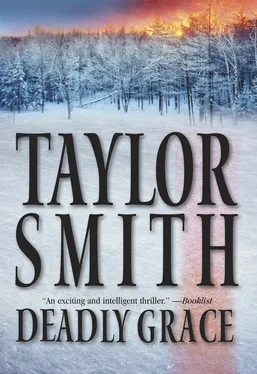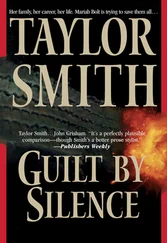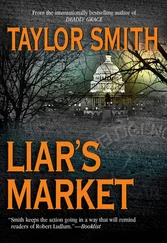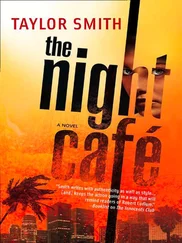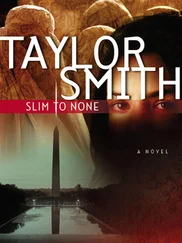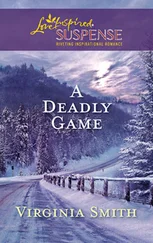“Well, now, hang on a minute, lemme think about that.” The old man’s bristly eyebrows skidded together over his nose as he frowned, thinking hard. “I asked her that once, now you mention it. A few months back, it was. I was up in her apartment fixin’ a leaky john. Just tryin’ to make a little conversation, ’cause God knows, that woman hardly says ‘boo’ herself. And I did ask her what she did for a living. Now where did she say she worked? It was someplace, you know, like…oh, hey!” He snapped his fingers. “I remember. The Smithsonian. Yeah, that’s it!”
Cruz’s pen paused in midair over the notebook. “Like, at that big old castle, do you mean, or at one of the other related museums? ‘Smithsonian’ covers a lot of territory.”
“Ah, well, now, that I can’t tell you. Anyway, what does the FBI want with Miss Meade? She in some kind of trouble?”
“It’s just a routine inquiry.”
“I had a guy here once worked for the State Department. FBI came around, then, too, checkin’ him out. For a security clearance, they said. That what this is about?”
“Something like that,” Cruz said. A flash of light bounced off the stained glass of the lobby door, and both men turned to see a black and white cruiser pull up to the front of the building, cherry lights rotating. “Looks like the police finally made it.”
“Well, it’s about friggin’ time.”
“I’ll leave you to deal with them, then, sir,” Cruz said, pocketing his notebook. “I appreciate your help, Mr.—?”
“Ripkin. No problem. I run a nice quiet buildin’, you know. Don’t want any funny stuff here.”
“Sure thing. Listen, Mr. Ripkin, I’m going to try to contact Miss Meade through her office, but if I miss her there, I’ll check back here again this evening. If you see her or hear from her before then, though, I’d appreciate it if you wouldn’t mention I came by.” Cruz had no idea whether or not Jillian Meade presented a risk of flight, but there was no point taking unnecessary risks.
“Whatever,” the super said distractedly, the glare returning to his beetle eyes as his attention shifted to the street, where two beefy D.C. patrolmen were lumbering up the building’s front steps. “About bloody time you guys showed up!” he hollered as the front door opened.
Cruz gave the patrolmen a sympathetic nod and slipped out around them.
There was a drugstore at the corner of the street. Cruz ducked into it to use the pay phone and put in a call to the Smithsonian Institution main switchboard. The operator, after consulting a master directory, was able to tell him there was a Jillian Meade listed on staff at the National Museum of American History, one of several buildings scattered around the capital that fell under the Smithsonian’s broad organizational umbrella.
The museum was located just across Constitution Avenue from the red-roofed buildings of the Federal Triangle. Its architecture was boxlike, a pink marble mausoleum that housed a vast collection of Americana, from the original star-spangled Banner that Francis Scott Key had seen “by the dawn’s early light,” to a pocket compass used by Lewis and Clark—a massive assemblage of memorabilia that ran the gamut from priceless national icons to sentimental kitsch.
In the main lobby, Cruz waited to ask the busy guard at the Information desk where he could find Jillian Meade’s office. All around him, the halls echoed with the shouts and laughter of children, the hissing and shushing of their teachers, and the valiant efforts of docents to be heard above the din of young voices and feet tramping across Italian marble floors. Once he’d gotten directions, Cruz dodged kids careening up and down the stairs as he made his way to the third floor, where, according to the guard, he would find Miss Meade in a corner suite of administrative offices next to the military history display.
Most of the third floor was taken up with exhibits of ceramics, printing presses, money and medals, but on the far northeast side of the floor was the permanent exhibit on the history of the American armed forces. Passing through it to reach the admin offices, Cruz ran an uneasy gauntlet past mannequins dressed in U.S. military uniforms from down through the years, standing on sober guard. There were artifacts and photos linked to various conflicts, from the Civil War, the Spanish-American War, the First and Second World Wars and the UN action in Korea, all laid out in glass-covered display cases, a proud collection of weapons, tactical plans, strategic maps and portraits of victorious men and officers.
By contrast, Cruz noted, the exhibit on Vietnam was pitifully small, tucked away in the farthermost corner of the section. It was a case study in controversy avoidance, set up to carefully dodge the temptation to assign blame for the debacle that had taken fifty-eight thousand American lives in a war that couldn’t be won. Five years after the fall of Saigon, emotions were still running too high for any kind of national consensus on that war, and the display reflected the national mood, treating the period like the historic equivalent of a drooling idiot relative whose embarrassing existence the family preferred to ignore. One day there would be a reckoning, Cruz thought. But not yet.
He was almost past the exhibit when a photograph in a case near the end of the display area caught his eye. He stopped and stared, his attention snagged not so much by the platoon of grunts in familiar jungle camouflage peering out at the camera, looking pitifully young in their face paint and false bravado, as by the buildings and hills behind them. He knew this place, he realized. Had stood on that very spot. It was a staging area outside Da Nang, a camp from which a small recon unit of seven men, himself included, had set out one day in 1966 under the command of an incompetent 1st Lieutenant named Darryl Houghton. A scared kid from Dayton, Ohio, Houghton had tried to cover his fear with bullying and intimidation, then issued one dumb order too many and never came back.
Cruz felt the air move and he looked nervously over his shoulder, but there was no one else around except for a uniformed guard standing watch over a Civil War cannon. For the moment, he was alone, falling through time and space. Logically, he knew the drumming sound in his ears was the rumble of kids’ feet running up and down distant halls and not the drone of helicopter blades, but he couldn’t explain why his nostrils had suddenly picked up the distinctive odor of heated gun oil—the familiar smell of petroleum steam that issued from the red-hot muzzle of an M-16 rifle after it had been fired. And there was something else: the sour stench of rotting plant material, the kind that always managed to work its way inside his clothes and ears and nose as he crawled on his belly on the jungle floor, trying to stay beneath the sight line of roving VC patrols. Worst of all, he was smelling black vinyl body bags, the way they got when they’d been filled and left out too long in the brutal heat.
An eruption of childish giggles brought him back to the present as a school group guided by a harassed docent spilled around the corner and spread out across the armed forces exhibit. Shaking ghosts off his back, Cruz moved on.
Passing through a door marked “Museum Staff Only,” he found himself in the reception area of the corner suite of offices to which the Information guard had directed him. A woman sat at a secretarial desk, turned away from him so that he was out of her peripheral field of vision. Fingers flying over the keys of an IBM Selectric, she seemed not to notice the click of the door or the raucous group outside.
Approaching the desk, Cruz saw why. She was wearing a set of headphones, half-hidden in the feathery, swept-back layers of her blond hair, connected to a Dictaphone machine on the desk beside her. Putting a hand to his mouth, he coughed once, then again, louder. She glanced up, then did a startled double take.
Читать дальше
